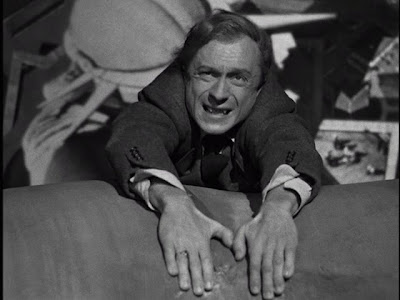Film history is riddled with so-called "love letters to the theater": All About Eve, Stage Door, Les Enfants du Paradis, The Band Wagon, The Last Metro. All exhibit not only an affection for the theater, but a knowledgeability, an insider's authenticity.
This makes John Cassavetes Opening Night (1977) genuinely unique. Not only does it seem to have a contempt for live theater, as contrasted with film--at least independent film, but it is shot through with inaccuracies and contrivances which bolster that contempt.
I've spent a lot of time reading and thinking about film, but I've spent more time actually working in theater. And I have never seen such a shambles in the professional theater as the mess that is presented in this film as a rehearsal. (As an example, look at the video above, in which a woman who should be sent for professional help is badgered and bullied into attempting some very half-baked and unconsidered staging.) Nor could a show hoping to go to Broadway expect to get there with such an ugly and dysfunctional set. There are stairs and doors that do not seem to go anywhere, not to mention scenes that boast a similar lack of direction and purpose.
Perhaps Cassavetes's purpose was to demonstrate how artificial live theater is compared to his own improvisatory film technique. But he stacked the deck. In an interview, Cassavetes admitted that although he knew he was supposed to write a "play within the film," he hated that play and could never complete it. If so, why did he go ahead with the film? Why not wait until he had the script of a good play, or at least a plausibly professional one, as one would expect from the playwright in the film, played by the affable Joan Blondell?
Then, once it is evident that the leading actress played by Gena Rowlands, on whom the financing of the show rests, has serious problems, why is no one assigned to be with her, stay with her, make sure she shows up when and where needed? (Not to mention no understudy and no back-up star. The producer in this film, played by Paul Stewart, is the worst ever. He obviously learned nothing from his days with the Mercury Theater under Orson Welles and John Houseman.)
And what is the purpose of the subplot about the fan who is killed in a random auto accident and begins haunting Rowlands? That whole thread is built up and massaged through some abortive visits to mediums, and then it is dropped and never reappears through the entire climax of the film, instead of precipitating the actress's final breakdown, which would have been logical.
Maybe she just has a breakdown because she realizes she's in a crappy play with a crappy director and a self-absorbed co-star. (Scary how good Cassavetes is, as he is in Rosemary's Baby at playing a narcissistic actor.) What Cassavetes is bad at is improvisation. Here he is, the grand guru of improv, elevating into an entire method and an aesthetic principle of filmmaking, and he is atrocious. He is repetitive, self-conscious, breaks character, completely without creativity or imagination. Were Cassavetes alive today, he could not pass the audition for the most basic improv class around today. Perhaps that explains why his films are so prolix and off-topic--he literally couldn't tell the good material from the bad.
One last note--what was the deal with Zohra Lampert? She is the most inert actress who ever lived. Her voice is flat and her face looks like it was shot with those tranquilizers that freeze your muscles. She expresses absolutely nothing, yet she worked non-stop through the 1960s and 1970s. Maybe directors thought that, instead of fighting with an actress to get her to do the scene right, they would get an actress who just did nothing--then at least, it's not wrong.
God knows she's not going to upstage Cassavetes.





No comments:
Post a Comment